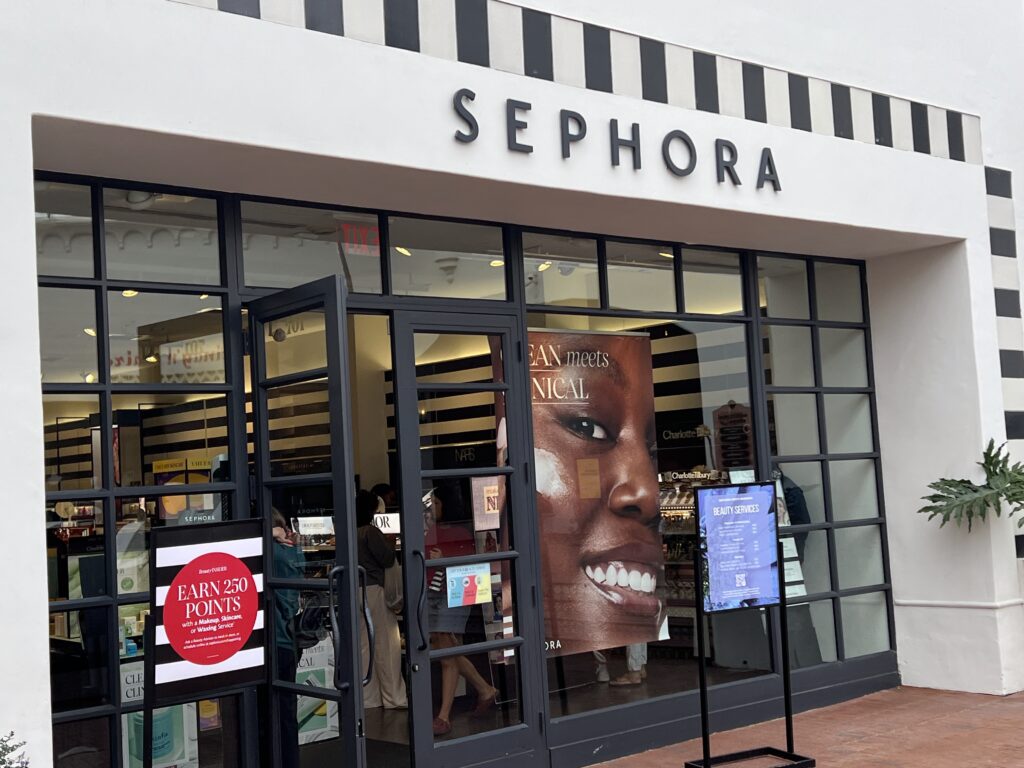As the holiday season approaches, Sephora is rolling out its much-anticipated Black Friday and Cyber Week 2024 sales, offering beauty aficionados an array of discounts, limited-time offers, and exclusive brand deals. The beauty giant has cleverly curated a shopping experience designed to not only increase sales but also strengthen its loyal customer base. With daily deals on top-selling skincare, makeup, and fragrances, this sale is expected to draw in millions of shoppers looking for both luxury and necessity at a discount.
At BigBoxBlog, we’ve closely observed Sephora’s tactics and how they reflect broader trends in the retail space. In this article, we will explore what makes Sephora’s Black Friday and Cyber Week strategies unique, the benefits and potential drawbacks for consumers, and how this aggressive sales push is impacting competitors and the wider beauty retail market.

Sephora’s Strategic Sales Push: Deals You Can’t Miss
For many, Sephora’s Cyber Week and Black Friday 2024 sales are an annual event, eagerly anticipated for the deep discounts and exclusive product offerings. In 2024, Sephora has taken a calculated approach by rolling out daily deals, offering up to 50% off select beauty products, including skincare, makeup, haircare, and fragrance. The sale officially kicked off on November 25th, with new discounts dropping each day, continuing until Cyber Monday (December 2nd).
What’s particularly striking about this year’s sale is the frequency of limited-time, app-exclusive offers. Sephora’s app provides early access to these deals, a move designed to increase both mobile engagement and app downloads. Additionally, Sephora’s Beauty Insider program offers members even more savings, exclusive access to sales, and the ability to earn extra points on certain purchases.
These daily rotating sales add an element of excitement to the shopping experience. Customers can shop from a curated list of 30% to 50% off popular brands each day, including Fenty Beauty, Tarte, Urban Decay, and Sunday Riley. The high frequency of deals, which vary by day, encourages shoppers to return to the site frequently and make impulse purchases.
How Sephora’s Sales Strategies Benefit Consumers
From a consumer’s perspective, Sephora’s Black Friday and Cyber Week sales are a golden opportunity to purchase premium beauty products at a fraction of the price. The brand’s expansive selection means there is something for everyone—from high-end skincare to makeup essentials, fragrance, and even haircare tools. For those looking to splurge on luxury beauty products without breaking the bank, Sephora’s sales make it easier to stock up on top-tier products without feeling guilty.
One of the standout features of Sephora’s strategy this year is its one-day-only brand deals. For instance, shoppers on November 24th enjoyed 30% off brands like Vegamour and Kate Somerville, while November 25th brought discounts on fresh and Urban Decay. These rotating deals keep the sales dynamic and exciting, preventing shoppers from feeling overwhelmed by too many choices at once.
Moreover, the Beauty Insider Program adds tremendous value to loyal customers. Beauty Insiders not only gain exclusive access to sales events but also earn reward points on their purchases, which can be redeemed for free products. The program’s tier system means that frequent shoppers can unlock even more benefits, making the Black Friday and Cyber Week sale a crucial time to maximize rewards.
For those hoping to get even more perks, Sephora offers a free sample bag with purchases over $90 (with the code BAGOFBEAUTY) and up to 50% off select gifts for Black Friday (November 29th to December 1st). These promotions encourage shoppers to spend more, while also giving them a chance to try new products.
Potential Drawbacks: Is This Sales Strategy Sustainable?
Despite the many benefits to consumers, there are potential drawbacks to Sephora’s aggressive sales tactics. As beauty industry experts, we’ve observed that while these sales are great for attracting budget-conscious shoppers, they can also pose a risk to the perceived exclusivity of luxury brands.
Sephora has carefully curated its collection of high-end products, many of which are associated with prestige and exclusivity. Yet, offering such steep discounts—sometimes as much as 50% off—could dilute the allure of these luxury brands. For example, Benefit Cosmetics’ Hoola Matte Powder Bronzer, a staple in many beauty routines, is marked down from $36 to $18 during Black Friday. While this might excite shoppers looking for a good deal, it raises questions about whether these discounts undermine the exclusivity of luxury beauty products.
Moreover, the pressure to constantly discount high-demand items may create an unhealthy reliance on sales events to drive traffic. In the long term, it could potentially erode full-price sales during the rest of the year. While Black Friday and Cyber Week are temporary sales windows, the deep discounts and constant promotional activity could condition customers to expect markdowns year-round, weakening the full-price brand perception.
Sephora’s App-Exclusive Deals: A Genius Move to Boost Engagement
Another cornerstone of Sephora’s strategy this year is the exclusive access given to app users. By offering daily deals through the Sephora app, the retailer incentivizes customers to download the app and engage with the brand on a deeper level. This tactic not only boosts app downloads but also allows Sephora to track consumer behavior more effectively, offering more personalized recommendations.
The app exclusivity also creates a sense of urgency. When customers know they can get a jump on deals before they hit the website or store, they’re more likely to act quickly, increasing conversion rates. The ability to plan ahead by seeing deals in advance gives shoppers an edge, encouraging them to return every day for new discounts.
However, some might argue that Sephora’s app exclusivity could alienate customers who prefer a more traditional shopping experience. Older generations, or those less familiar with mobile technology, may feel left out of these deals. While Sephora likely expects that the majority of its consumer base is mobile-savvy, it’s important to consider the potential impact on less tech-oriented shoppers.
The Impact on Competitors: What Other Beauty Retailers Can Learn
Sephora’s bold sales strategy isn’t just a win for consumers; it also sends a clear message to its competitors. Beauty retailers such as Ulta Beauty, Nordstrom, and Macy’s will undoubtedly feel the heat from Sephora’s extensive promotions. Ulta, in particular, has long been Sephora’s biggest competitor, but it has typically offered a less aggressive sales strategy. This year, Sephora’s staggered daily deals, combined with app exclusives, could force Ulta to rethink its own approach to Black Friday and Cyber Week.
The rise of e-commerce and omnichannel shopping also means that Sephora has an advantage over traditional department stores. While Ulta and department stores like Nordstrom may offer similar discounts, Sephora’s seamless integration of online and in-store shopping, coupled with its exclusive app deals, gives it an edge in terms of customer engagement. Sephora has successfully created an ecosystem where customers can seamlessly shop across channels, ensuring that no matter how they prefer to shop—online, through the app, or in-store—they get a consistent and personalized experience.
Furthermore, luxury beauty brands might take note of Sephora’s aggressive sales push. While luxury beauty often thrives on exclusivity, Sephora’s combination of luxury and accessibility through discounts could encourage other high-end retailers to consider similar sales tactics. The challenge for these brands will be finding the balance between offering attractive discounts and preserving their brand image.
The Bottom Line: A Risk or a Reward?
Sephora’s Black Friday and Cyber Week sales are an exciting development for beauty lovers looking for discounts on top-tier products. From limited-edition sets to app-exclusive deals, there’s no shortage of opportunities to save on luxury skincare, makeup, and fragrance. The Beauty Insider program and daily rotating discounts are designed to keep customers engaged and loyal throughout the season.
However, as beauty experts, we acknowledge that the deep discounts and the heavy reliance on sales promotions could potentially harm the long-term value of luxury products. For other retailers in the space, Sephora’s sales strategy sets a new benchmark for how beauty brands can effectively use discounts to drive traffic, build customer loyalty, and increase engagement.
While Sephora’s aggressive approach is likely to benefit the company in the short term, it will be interesting to see how this approach impacts brand perception and long-term profitability. The big question remains: will customers return to Sephora post-holiday, or have they been conditioned to expect discounts all year round? Time will tell whether this sales model continues to be a sustainable growth strategy or one that diminishes the cachet of luxury beauty products in the long run.
For now, Sephora is setting the stage for a strong holiday season. Their Black Friday and Cyber Week deals are a powerful way to capture attention, but other beauty retailers must continue to innovate to stay competitive in an increasingly discount-driven market.
